|
|
|
Sort Order |
|
|
|
Items / Page
|
|
|
|
|
|
|
| Srl | Item |
| 1 |
ID:
111918
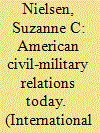

|
|
|
|
|
| Publication |
2012.
|
| Summary/Abstract |
Fifty-five years after it was first published, Samuel Huntington's The soldier and the state remains an essential starting point for serious discussions of American civil-military relations. In part this is due to the boldness and ambition of the author. Huntington brought theory to a research area that had suffered from too little theorizing and then went on to formulate concepts that scholars and practitioners of civil-military relations still find useful. These include: the conceptualization of the military as a profession; the articulation of the two central forces shaping the nature of military institutions as the functional and the societal imperatives; and the formulation of subjective and objective control as the two main patterns of civilian control. This review article briefly revisits these concepts and argues that they retain utility in illuminating important issues in American civil-military relations today. It also argues, however, that Huntington's contributions were productive but not perfect. Some of his specific definitions, such as the content of military expertise, are debatable. Some of his central concerns, such as whether the United States could sustain a strong military over an extended period of time, are no longer central today. Finally, in some places the literature has moved beyond what Huntington offered. The best example is the ongoing debate over how the country's political leaders and its most senior military officers should interact. It is precisely on this point that Huntington's objective control is the weakest. While The soldier and the state certainly does not deserve uncritical acceptance, it does continue to merit a fair hearing. Current discussions of American civil-military relations are likely to be more reasonable and productive if Huntington is given a voice.
|
|
|
|
|
|
|
|
|
|
|
|
|
|
|
|
| 2 |
ID:
119847


|
|
|
| 3 |
ID:
172319
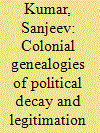

|
|
|
|
|
| Summary/Abstract |
This article is an attempt to conceptualise and theoretically explain the colonial genealogies of the processes of state-making and state-construction in post-colonial South Asia. In pursuit of this, the article seeks to theorise the colonial ways of providing a sense of fixity of political territoriality, held together by colonially crafted institutions of metropolitan governance, as an independent variable in determining the nature of the processes of state-making and state-construction in the region. On this count, an enquiry into the complex trajectory of these post-colonial political processes, which are the dependent variables for this article, is the fundamental problematic of analysis. This problematic would be decoded with the help of a dual conceptual framework, involving what Samuel Huntington designates as political decay and the legitimation crisis given by Jurgen Habermas. In the context of South Asia, the predicaments of political decay and legitimation crisis, according to this article, manifest as after-effects of engagement on the part of the region’s post-colonial polities with the imported values of colonial modernity and neoliberal economic reforms. By drawing instances from two countries of the Indian subcontinent, Pakistan and Bangladesh, the article tries to show how these after-effects have played out in the form of a tumultuous political history of the processes of state-making and state-construction. The article, in this way, is an attempt to theorise the inter-sectionalities between the colonial and post-colonial periods of South Asia. This has been done here by problematising such a historical inter-sectionality from the perspective of the two intervening variables—the received values of colonial metropolis and the morals of modernity—mediated through neoliberal economic reforms.
|
|
|
|
|
|
|
|
|
|
|
|
|
|
|
|
| 4 |
ID:
096120
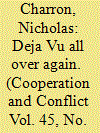

|
|
|
|
|
| Publication |
2010.
|
| Summary/Abstract |
Many in the media have depicted conflicts between the Western and Muslim worlds as a 'Clash of Civilizations' (CoC), and this has revived many of the questions surrounding the value of Samuel Huntington's CoC theory. Previous empirical tests have analysed his theory using low-level conflict at the interstate level or violent conflict at the subnational level. The former have demonstrated little or no empirical support for his theory, while the results in the latter group are mixed. This analysis adds to previous empirical studies in a number of ways. One, the empirical models test CoC exclusively in the post-Cold War era. Two, along with examining the civilizational determinants of military interstate disputes, as prior studies have done, I include models that focus exclusively on interstate wars, because Huntington frequently points out that a CoC between states will lead to violent political conflict. Finally, this study directly tests Huntington's civilizational 'fault lines' and Islamic 'bloody border' hypotheses. I include an extension and find that intra-civilizational conflict is relatively rare in the post-Cold War era. Contrary to earlier analyses, the data show strong empirical support for CoC, particularly when focusing on violent international conflict in the post-Cold War era, and the results are robust when testing the hypotheses with alternative data on international crises.
|
|
|
|
|
|
|
|
|
|
|
|
|
|
|
|
| 5 |
ID:
145121
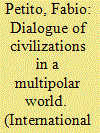

|
|
|
|
|
| Summary/Abstract |
In this article, I explore the relationship between the new multipolar trends related to the emerging powers and the idea of dialogue of civilizations. My starting point is to understand multipolarity as part of a broader epoch making process of transformation of contemporary international society beyond its Western-centric matrix. In the first part of this article, I therefore argue for an analytical understanding that emphasizes the emergence of a new multipolar world of civilizational politics and multiple modernities. In the second part of the article, I reflect on how to counter the risk inherent in the potential antagonistic logic of multipolarity by critically engaging the normative Huntingtonian construction of a multicivilizational-multipolar world order. I argue that the link between dialogue of civilizations and regionalism could represent a critical issue for the future of global peace. In particular, multiculturally constituted processes of regional integration are antidotes to the possible negative politicization of cultural differences on a global scale and can contribute to the emergence of a new cross-cultural jus gentium. These elements are critical to the construction of a realistic dialogue of civilizations in international relations while preventing the risks inherent in its growing multipolar configuration. They shape what, drawing on Amitav Acharya's work, could be named a multicivilizational-multiplex world order.
|
|
|
|
|
|
|
|
|
|
|
|
|
|
|
|
| 6 |
ID:
144919
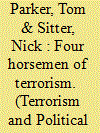

|
|
|
|
|
| Summary/Abstract |
David Rapoport's concept of Four Waves of terrorism, from Anarchist terrorism in the 1880s, through Nationalist and Marxist waves in the early and mid-twentieth century, to the present Religious Wave, is one of the most influential concepts in terrorism studies. However, this article argues that thinking about different types of terrorism as strains rather than waves better reflects both the empirical reality and the idea that terrorists learn from and emulate each other. Whereas the notion of waves suggests distinct iterations of terrorist violence driven by successive broad historical trends, the concept of strains and contagion emphasizes how terrorist groups draw on both contemporary and historical lessons in the development of their tactics, strategies, and goals. The authors identify four distinct strains in total—Socialist, Nationalist, Religious, and Exclusionist—and contend that it is possible to trace each strain back to a “patient zero” active in the 1850s.
|
|
|
|
|
|
|
|
|
|
|
|
|
|
|
|
| 7 |
ID:
185252


|
|
|
|
|
| Summary/Abstract |
Samuel Huntington theorized in The Soldier and the State that rather than make the military in the image of society (subjective control), both superior civilian control and military outcomes would result if the military was allowed its own sphere and culture, shaped by military requirements (objective control). Since 1963, the Canadian Armed Forces have argued for objective control, while political leadership and the country have largely paid little attention to military demands for greater social independence. An examination of defense policy, the “civilianization” crisis, the Somalia Inquiry, and diversity legislation and programs demonstrate the triumph of subjective control. This article concludes that subjective control has had costs to civilians in military shirking and to the military in alienation from its parent society. Huntington remains useful, but it is time to consider modern alternatives to understand civil-military relationships.
|
|
|
|
|
|
|
|
|
|
|
|
|
|
|
|
| 8 |
ID:
186350
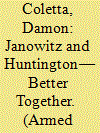

|
|
|
|
|
| Summary/Abstract |
Suzanne Nielsen and Hugh Liebert recently published “The Continuing Relevance of Morris Janowitz’s The Professional Soldier for the Education of Officers” in which they argued that officer education is too enamored with Samuel Huntington’s aging theory of civil–military relations from Soldier and the State. Huntington’s ideal of objective control grants senior military advisors autonomy within their professional sphere, and it best ensures that unvarnished military expertise survives politically charged national security decision making processes intact, regardless of which party controls the White House. While these features explain Huntington’s traditional popularity with the military, Nielsen and Liebert warn that Huntington’s separation between military and civilian matters in theory engenders wishful thinking in practice, so much so that officers neglect, to the detriment of national policy, Morris Janowitz, Huntington’s cofounder of the modern study of civil–military relations. However, the civil–military community should reconsider banishing Huntington in order to appreciate Janowitz.
|
|
|
|
|
|
|
|
|
|
|
|
|
|
|
|
| 9 |
ID:
066892


|
|
|
| 10 |
ID:
143534
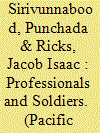

|
|
|
|
|
| Summary/Abstract |
Thailand’s military has recently reclaimed its role as the central pillar of Thai politics. This raises an enduring question in civil-military relations: why do people with guns choose to obey those without guns? One of the most prominent theories in both academic and policy circles is Samuel Huntington’s argument that professional militaries do not become involved in politics. We engage this premise in the Thai context. Utilizing data from a new and unique survey of 569 Thai military officers as well as results from focus groups and interviews with military officers, we evaluate the attitudes of Thai servicemen and develop a test of Huntington’s hypothesis. We demonstrate that increasing levels of professionalism are generally poor predictors as to whether or not a Thai military officer prefers an apolitical military. Indeed, our research suggests that higher levels of professionalism as described by Huntington may run counter to civilian control of the military. These findings provide a number of contributions. First, the survey allows us to operationalize and measure professionalism at the individual level. Second, using these measures we are able to empirically test Huntington’s hypothesis that more professional soldiers should prefer to remain apolitical. Finally, we provide an uncommon glimpse at the opinions of Thai military officers regarding military interventions, adding to the relatively sparse body of literature on factors internal to the Thai military which push officers toward politics
|
|
|
|
|
|
|
|
|
|
|
|
|
|
|
|
| 11 |
ID:
188797
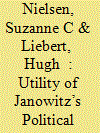

|
|
|
|
|
| Summary/Abstract |
In the pages of this journal, Damon Coletta and Tom Crosbie published a response to our article entitled, “The Continuing Relevance of Morris Janowitz’s The Professional Soldier for the Education of Officers.” In that article, we argued that Janowitz’s emphasis on the need for political awareness in the U.S. military should receive greater attention in the education of today’s officer corps. Coletta and Crosbie suggest that we are too ready to abandon Samuel Huntington’s classic work, The Soldier and the State. In this continuation of that dialogue, we respond with three clarifications and three substantive disagreements. Huntington and Janowitz offer divergent perspectives on the issues of officer education and “political virtue,” we suggest, and Janowitz’s perspective deserves greater weight that it has traditionally received. Coletta and Crosbie also place greater emphasis on the separability of political and military affairs than is warranted, and Janowitz is more helpful here as well.
|
|
|
|
|
|
|
|
|
|
|
|
|
|
|
|
| 12 |
ID:
163576
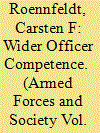

|
|
|
|
|
| Summary/Abstract |
Identifying and developing officer competence is important to a nation’s security and a crucial attribute of a legitimate military establishment. Critics have claimed that the U.S. officer corps favors a narrow conception of expertise that limits the armed forces’ utility as an instrument of policy. Drawing from the dialogue between Huntington and Janowitz, as well as Aristotle’s notion of practical wisdom, this article proposes a wider understanding of officer competence consisting of four distinct conceptual categories. The U.S. defense establishment favors “military skill” over other categories of competence. As a result, the officer corps is poorly prepared for 21st-century warfare. To remedy this situation, professional military education should cultivate military leaders that, in addition to military skill, have sociopolitical competence and practical wisdom. In this context, this article suggests strategies to develop such competencies that officers need to be able to achieve a diversity of national political goals.
|
|
|
|
|
|
|
|
|
|
|
|
|
|
|
|
|
|
|
|
|